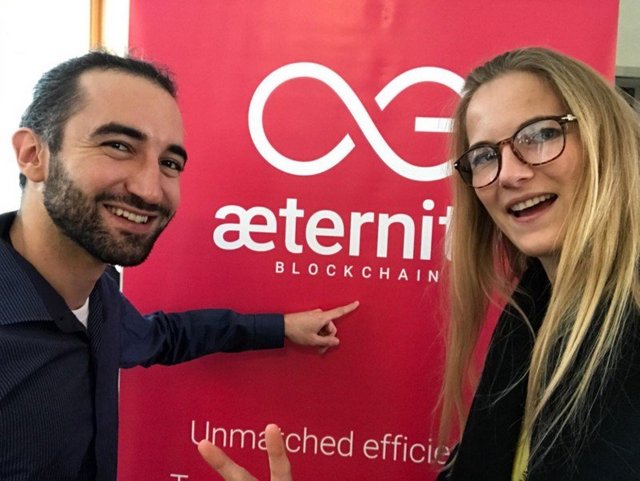Most current projects will disappear in 5 years, says 'Godfather of Ethereum"

A depiction of the pearly gates of heaven open with the bright side of heaven contrasting with the duller foreground
‘Godfather of Ethereum’ and founder of æternity, Yanislav Malahov, tells Bitcoinist why his startup chose to set up shop in the tiny country of Liechtenstein, which countries blockchain companies must stay away from, and why he believes most current cryptocurrency projects will fail in the next 5 years.
YANISLAV MALAHOV: LIECHTENSTEIN REGULATORS ‘VERY OPEN’ TO BLOCKCHAIN
The sixth smallest country in the world, Liechtenstein, has become one of the most appealing destinations in the world for startups in the cryptocurrency space.
Bitcoinist: What is your field of expertise in cryptocurrencies?
Yanislav Malahov (YM): We are building æternity blockchain – a decentralised, open-source æpps platform that scales through state channels running smart contracts off-chain. At æternity, we specialize in scalable and efficient blockchain systems.
Our team is composed of engineers with hundreds of years of cumulative development experience with a strong emphasis on Erlang/Elixir and blockchain development. The cryptocurrency of æternity is the AE token. Currently an ERC-20 token on the Ethereum network, AE will be converted to a cryptocurrency upon mainnet launch (Q2, 2018).
Bitcoinist: What are you trying to achieve with this project? What makes it different from Ethereum and other smart contract platforms?
YM: æternity introduces a new programming language that supports formal verification and allows the writing of simpler, safer code. It uses an ASIC-resistant, memory-bound Proof-of-Work with less than 15 seconds block time. æternity also features an integrated naming system and oracles, which could be used to request and access data from various data providers. The VM accommodates compiled Solidity contracts.
Perhaps most importantly, all components are native features of the æternity system. They are not meta layers on top of a blockchain (like Lightning, Raiden, Plazma, Oraclize, etc.) but parts of the core protocol. This ensures unmatched efficiency and significantly reduces the cost of running smart contracts and making lightning fast transactions.
æternity is being built with the user and developer in mind. Following a mobile-first approach, something uncommon to most blockchain projects, we aim to produce easy-to-use, intuitive applications that the average user will feel comfortable using. In addition, we want to help developers feel comfortable building decentralized æpps on top of æternity and contribute code to the core blockchain. We are therefore preparing effective developer tools that will be available on mainnet launch.
Bitcoinist: You’ve recently been to the tiny country of Liechtenstein. What is their view of this new technology?
YM: Liechtenstein aims to become an international hub for blockchain projects. It provides direct and quick contact with regulators and a friendly environment for blockchain-focused development. Liechtenstein wants to attract businesses from the nascent blockchain industry, which want to focus on building a commercially-successful product, without being distracted too much by administration.

Bitcoinist: How open was the Principality’s Prince in relation to cryptocurrencies? Could such a small country adopt Bitcoin, for example, for payments (e.g. for taxes) in the future?
YM: The Liechtenstein regulators (esp. financial market authorities) are very educated about cryptocurrencies and are very open to the whole blockchain idea – everything is possible.
There are numerous blockchain-related activities in the country, and the atmosphere with the authorities is a very friendly one. Keeping in mind the size of the country, it could be a suitable location for a number of blockchain-inspired technology applications, including cryptocurrencies.
Bitcoinist: What can a project like æternity offer to a country like Liechtenstein?
YM: æternity is one of the most popular blockchain projects in the country (if not the most popular). It supports the vision of Liechtenstein’s government of establishing a friendly space for blockchain businesses. We would love to develop a thriving ecosystem of projects and attract some of the brightest minds from the developer community (something we have proven to be great at).

Bitcoinist: What would you say are the most crypto-friendly jurisdictions in the world? Most unfriendly countries (where you would never do business with)?
YM: Friendly jurisdictions: Liechtenstein, Switzerland, Estonia, Singapore, Isle of Man, Belarus, and Malta.
Unfriendly: China, some US states, Russia, and India.
Worryingly, EU states are also considering restrictions on buying/selling cryptocurrencies. Recently, all banks in Bulgaria stopped serving cryptocurrency-related businesses, effectively disabling users and companies to buy cryptocurrencies from regulated exchanges and moving cryptocurrency-related value transactions away from banks.
IMF’s head recently stated that crypto regulation is inevitable.
Bitcoinist: Do you believe it will be easier said than done on a national or global level? What kind of regulatory approach do you expect most nations to follow in the future if their money monopoly is threatened?
YM: It is hard to say what will happen exactly. However, it is more than certain that different jurisdictions will regulate the industry differently. Some will apply total bans on usage of cryptocurrencies; others might require crypto-users to register their wallet addresses; yet others might allow the distribution and usage of centralized, government-issued cryptocurrencies; and finally – there will be the friendly jurisdictions that will attract the largest number of businesses and users.
There is also another possibility – will countries regulate crypto or will crypto regulate them? The technology is powerful enough to withstand prolonged attacks by governments and institutions who feel threatened. At the same time, global debt is reaching record levels, and the idea of the “everything bubble” is attracting more and more attention. What will happen to cryptocurrencies during the next global financial crisis? Time will tell.

Bitcoinist: Where do you see this industry in 5 years? Was the recent price drop only a hiccup on a path to a trillion dollar industry?
YM: If cryptocurrencies and decentralized applications manage to withstand the pressure from unfriendly countries, they will continue to earn the trust of users worldwide. Moreover, they will become much more “natural” to use and will even enter popular culture.
I foresee that in the next 5 years, many of the projects that exist currently will disappear, freeing up market share for the most successful ones.
Only decentralized applications that solve real-world problems and are easy to use will continue to exist and will continue to grow. Blockchain technology will scale and allow the creation and introduction into the mainstream of many new use-cases that will provide increased privacy; working, decentralized micro-economies and companies; as well as a more egalitarian wealth distribution.
The market capitalization of the persevering projects will most probably increase from current levels.
Bitcoinist: Anything else you’d like to add?
YM: At æternity, we are looking forward and working tirelessly to realize the brave new world that decentralized blockchain technology can deliver. Research into decentralized systems of governance will be fundamental to understanding ourselves better and in devising ways to organize our global society and economic interactions more efficiently.
Will some nations adopt cryptocurrency and blockchain governance platforms in the future? Let us know in the comments below!Original Post: Bitcoinist